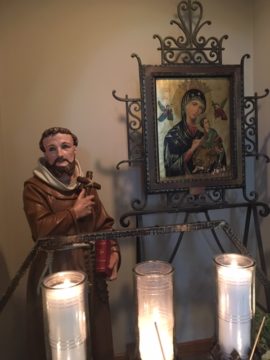This Sunday’s Scripture continues the story of Easter. The Lord is with us! We offer a Franciscan Gospel reflection and questions written by Fr. Paul Gallagher, OFM for your prayer. They are edited by Franciscan Sister of Christian Charity Sister Anne Marie Lom and Joe Thiel. The excerpts from the Sunday readings are prepared by Joe Thiel. To read or download the complete pdf with excerpts for your prayer, please click here: Franciscan Gospel Reflection May 19 2019. Excerpts are from the Lectionary for Mass for Use in the Dioceses of the United States of America, second typical edition © 2001, 1998, 1997, 1986, 1970 Confraternity of Christian Doctrine, Inc., Washington, DC. Used with permission. All rights reserved. No portion of this text may be reproduced by any means without permission in writing from the copyright owner. Please include this information when printing. Iron Mountain, Michigan. Mary Immaculate of Lourdes Catholic Church, Iron Mountain, Michigan
John 13:31-35
When Judas had left, Jesus said, “Now is the Son of Man glorified, and God is glorified in him. (If God is glorified in him,) God will also glorify him in himself, and he will glorify him at once. My children, I will be with you only a little while longer. You will look for me, and as I told the Jews, ‘Where I go you cannot come,’ so now I say it to you. I give you a new commandment: love one another. As I have loved you, so you also should love one another. This is how all will know that you are my disciples, if you have love for one another.”
Background
The gospels for the other Sundays in the Easter Season have focused on the empty tomb or on the disciples’ experiences of the risen Lord. This gospel text shifts back in time to before Jesus’ crucifixion, when Jesus was celebrating his final Passover with his disciples. It fits into the Easter season because in some sense the glory of God is revealed in the person of Jesus and his willingness to live through the events of the passion and resurrection. Jesus’ faithfulness reveals God’s faithfulness.
The verses immediately preceding the text for today are: “So Jesus said to Judas, ‘What you are going to do, do quickly.’ Now none of those reclining at table realized why he said this to him. Some thought that since Judas kept the money bag, Jesus had told him, ‘Buy what we need for the feast,’ or to give something to the poor. So he took the morsel and left at once. And it was night.” (John 27b-30)
Judas left the Passover celebration to set in motion Jesus’ arrest, trial and crucifixion. It was as if a leaf that had fallen into a stream was set on a journey down the stream. While it appears as if only suffering and death await, the truth is much larger. The hour of suffering and death is also the hour of Jesus’ greatest glory. Jesus is glorified in his willingness to endure suffering and death, and in the ultimate expression of his willingness to surrender to God’s will. But at the same time, it is God’s ultimate expression of God’s desire to be one with us that will not be cancelled or diminished by the prospect of suffering and death. God will not retreat from God’s desire to be with us, no matter the cost. God does not intervene to cancel Jesus’ passion and death, but instead acts to reveal its meaning.
In verse 33, Jesus addresses the remaining disciples as “my children.” This is an affectionate way for a teacher of the time to address his students. As Jesus has acted to make known God’s love for them, they are now to act to make God’s love present to each other. Jesus will no longer be present among them; therefore, they are each to take up the role of teacher in how they are present to one another.
Reflection Questions
1. When I think of the things that I have done so that others would be proud of me…
2. When I think of the things that I have done to bring shame to others…
3. Do you recall a time in your life when you realized that the choice you were making at that moment was going to profoundly affect the rest of your life?
4. How does the fact that at this moment Jesus addresses the disciples as “my children” affect how you hear the rest of Jesus’ instruction?
5. How has God loved you?
6. Can you take some time now to talk to God about your awareness of God’s love for you, the commandment to love others as God has loved you, or some other awareness that rose within you from this text?





